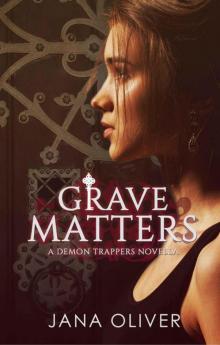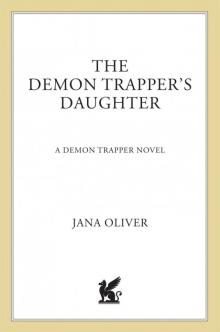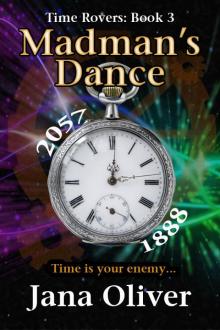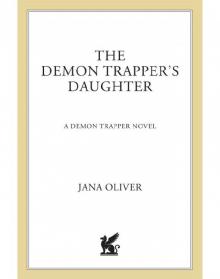- Home
- Jana Oliver
Madman's Dance (Time Rovers) Page 11
Madman's Dance (Time Rovers) Read online
Page 11
“Your head wound has healed very neatly,” Alastair reported, feeling some positive news was needed.
“Probably the vicar’s salve,” Keats remarked. “He seemed very proud of it.” When he saw the doctor’s puzzled expression, he added, “I met him and a very pretty lady named Lily when I was staying with the bums on my way to Ingatestone. The vicar was very…gregarious.”
Alastair clicked the bag shut. “I’ll go to your rooms, obtain a change of clothing and toiletry items.”
“Thank you. Pull out my new suit. I just got it from the tailor. I never thought I’d be wearing it at my trial.”
There was an awkward pause.
“They’ll move me in the next day or two. I’ll be at Newgate.”
“I’ll be there. If you need anything, send me word. I mean that.”
Keats nodded. “Fisher came to see me this morning.”
“How did it go?”
“Very poorly. He’s furious at me for being an idiot.”
“It is hard when a father sees a son headed in the wrong direction.”
Keats looked up at him. “He has become my father in many ways, and I have let him down.”
Alastair placed a hand on his friend’s shoulder. “Keep hope. We’ll get this sorted.” He saw the empty look in the sergeant’s eyes.
He doesn’t believe a word I’ve said.
~••~••~••~
“Is this like Chicago?” Ramsey asked as they entered the Britannia.
Anderson glanced around the pub. “Exactly, except I can’t understand what most of these folks are saying.”
Ramsey cracked a smile. “You should hear them when they’re not drunk. It’s worse.”
The publican promptly served up the pints they’d ordered. Ramsey shoved the coins across the bar and gestured for Anderson to pick up the ale. He trailed after the inspector as they went on the hunt for a free table.
“This’ll do,” Ramsey said, settling his bulk so he could watch the door.
“Do you honestly expect someone to come up to you so openly?” Anderson asked after a sip of his pint.
“That’s not how it works. The people I need to talk to will see me here. If they have anything to tell me, they’ll find me later in the evening. It’s like being a whore, you see. You advertise your wares and then wait for the punters to come to you.”
“You’re a very colorful fellow, Inspector.”
The cop’s attention moved to him. “You’re the same, Mr. Anderson, though you look otherwise.” He scrutinized the man’s face. “There’s more to you than what you’re telling Warren.”
“Such as?”
“I sent a cable to Chicago. The Herald never heard of you.” Ramsey waited for the reaction.
A nod of respect came his way, along with a faint smile. “Why did you think to check?”
Hard to rattle. He’d be a good one in a fight.
“I checked because I’m a copper. Warren, he’s a military man. He doesn’t expect people to lie to him.” Ramsey leaned over. “So who the hell are you?”
“Robert Anderson…Pinkerton Agency,” the man replied. “I have a letter of introduction in my pocket, if you need it.”
“No. That fits. Course, I’ll be checking that as well. Warren know who you are?”
“Most certainly.”
“So why are you nosing around London?”
“Explosives.”
Ramsey stiffened. “That’s our job.”
“It is, but we’ve heard there is a chance some of that missing dynamite might end up in New York or Chicago.”
“Not everyone’s happy in America?” Ramsey smirked.
“No, they’re not. It won’t be the Irish, of course. We’re a safe haven for them, but there are others who love to see our country in revolt.”
Ramsey sucked down more of his ale. “So what about those newspapers articles you’re supposed to writing?”
“I send the stories to a reporter who does work for the Herald. He files the articles under both our names, but collects the money.”
“That doesn’t trouble the newspaper?”
“Not really, as long as they get a good story.”
“What about your bosses?”
“They’re fine with the arrangement.”
“Sounds like a right mess,” Ramsey commented, his eyes roaming over the patrons. “I’ll have to tell Fisher.”
“I expected that,” the man replied. Anderson leaned back in his chair, his eyes roaming over the pub’s patrons. “Anyone look promising?”
“A couple. We’ll finish off these pints and then go for a stroll. You posh detectives, you know how to defend yourselves?”
“Yes.”
“Good. Problem with displaying our wares is that not everyone just wants to talk to us.”
After they’d drained their drinks, Ramsey set off at a brisk pace, causing Anderson to hustle to keep up with him. “After we’re done, we’ll have to go a bit before we can catch a hansom,” the inspector advised. “They don’t like coming into this part of the city.”
“I can see why.”
The inspector swept his eyes over the street, trying to see it from the American’s point of view. Costermongers, newsboys, whores, a flower seller or two, a few shady characters lounging in the doorways, sizing up potential marks.
Heaven. At least to a copper.
After a series of twists and turns, Ramsey shot down an alley. It was grimy, like most of them.
“Now what?” Anderson asked.
“We wait.”
“I liked it better in the pub.”
It wasn’t long before a figure edged down the passageway, constantly looking over his shoulder.
Ramsey stepped forward. “Keep watch for us, will you?”
“As you wish,” Anderson replied, moving a few steps away to give the illusion of privacy.
“Copper,” the man mumbled.
“Evening, cheesemonger. Any word?”
The man shook his head. “Nothing. It’s quiet right now.”
“Quiet in a good way or…”
Another shake of the head. “People are scared.”
“Because of our Irish friend?”
“No.”
That surprised Ramsey. “Someone new in town?”
“No. Has something to do with those explosives.”
“Flaherty has those,” Ramsey said, testing the waters.
A shake of the head. “I’ve heard rumors that he doesn’t.”
Then Keats was right. “Anything else?”
“That’s all I got.”
Ramsey offered a coin. “If you hear anything more, let me know.”
With one last look at Anderson, the informant slipped into the shadows.
Ramsey grumbled, “You think you know all the rats, and another crawls out of the woodwork.”
“This alley is rank,” Anderson commented, twitching his nose.
“They don’t stink in Chicago?”
The edges of the fellow’s mouth tugged slightly upward. “No, we pave them in gold. I thought everyone knew that.”
Ramsey laughed. “Shite is more likely. I heard about your big stockyard.”
There was the sound of footsteps as a snaggly-toothed man emerged out of the shadows.
“Oy, it’s that rozzer come to spy on us.”
“Old Dan. Been a while, hasn’t it?” Ramsey looked over at Anderson and gestured toward the newcomer. “Dan here went to Pentonville Prison for robbery. Twice.” He lowered his voice. “Keeps making the same mistakes. He’s not quick on the uptake.”
Old Dan snorted. “Yer the copper who put me there. Whatcha doin’ on my patch?”
“London is my patch, gents. Maybe someone didn’t you tell you that.”
“Ya think ya own it all, don’t ya?” The man spat. “I hates rozzers. Same with me mates here.” Three other men emerged out of the shadows.
Ramsey laughed. “Is this enough like Chicago for you, Mr. Anderson?”
“Just like home.”
The inspector put his hands on his hips. “It’s this way, gents. You walk off and we call it even. You mess with us, you go to the clink. You might even end up with something broken. That would be a shame, though I certainly won’t cry about it.”
“There’s four of us. We like those kinds of odds, rozzer,” Old Dan replied.
As the toughs moved forward, the inspector squared off, raising his fists. Anderson just stood there. The moment one of them came into range, his hand flicked out and caught the man across the neck. The fellow was down in an instant, moaning in pain.
The inspector’s face broke into an ecstatic smile. “Last chance, gents. You can walk away right now, or you’re up for a proper kicking.”
Half an hour later, they were in a hansom heading toward the Yard.
“What was it you did back there?” Ramsey asked incredulously. “I’ve never seen someone dropped that fast!”
“Posh detective secret,” Anderson replied with a rare grin. “Can’t share it with you.”
The inspector guffawed. “I deserved that. I about split a gut when they took to their heels.”
“It’ll make a good article for the paper. Of course, I’ll say you dropped the man instead of me.”
“No. Tell it like it happened.” Ramsey switched back to business. “Keats’ arraignment is in the morning. Once that’s done, we’ll take a day in the country.”
“After Whitechapel, it’ll be a nice change,” Anderson replied.
“Anything is a nice change after this sewer.”
Chapter 12
Alastair stood across the street, gathering his courage. Tonight, he would be taking an extraordinary gamble. The Artifice Club was a large, five-story structure with Doric columns. Inside were a series of rooms housing various gentlemen’s clubs. The Conclave was at home in #8, which for some arcane reason shifted locations within the building on a daily basis.
Of the four members, Alastair was the most junior. George Hastings, nominally the leader of the group, ruled mostly by an overbearing attitude. His lackey, Edward Cartwright, always sided with him. Then there was Malachi Livingston, the man Jacynda believed was from her time.
Alastair shivered, focusing harder on the image he presented. People walking by would see a middle-aged man, well dressed in top hat and cape. They saw what he wished them to see. Nevertheless, even the shifters were not immune to discovery. He’d have to surrender his outer garments to the room steward, so he had purchased them just this afternoon. Tomorrow morning, he would resell them, hopefully not receiving the worse end of the bargain.
As he waited, he realized how far he’d fallen. He had intended only to use his ability for Keats’ benefit, but now it was for Jacynda’s. Tomorrow, it might be for someone else’s. Each step took him further down a road he’d never intended to travel.
Though he hated to admit it, this deception was a matter of necessity, even were it not for Jacynda’s condition. If Livingston were absent from the club for too long, they’d vote a replacement, most likely another one of Hastings’ toadies. Hastings was not known for rational decisions: he’d hired thugs to destroy Alastair’s clinic when the doctor refused to follow The Conclave’s orders. Ironically, that had led to the doctor’s new situation with Reuben Bishop. Nevertheless, Alastair certainly wasn’t about to thank the old warhorse.
He’d always thought The Conclave was the power structure in the Transitive community. Now he saw it more as a decoy, a lightning rod in case someone needed to take the blame. It was Livingston’s view that the Ascendant pulled George Hastings’ strings. In return, Hastings appeared important to those who didn’t know the truth. It was all a game, like some amateur séance designed to awe the gullible.
I almost fell for it.
Alastair took a deep breath and strode across the street. If Livingston were inside the club, it would be awkward. If not, he would preserve the man’s position and might learn something of value during the encounter.
As he entered the antechamber, Ronald, the eighth room steward, snapped to attention. “Good evening, Mr. Livingston,” he greeted with a polite smile.
“Good evening, Ronald. I trust all is well,” Alastair replied, working hard to sound just right. Other Transitives could mimic voices with ease. He was too unseasoned to do it unconsciously.
“Very well now that you’ve returned,” Ronald said. “I trust you had no difficulties?”
“Only urgent business matters,” Alastair replied, offering his hat and cape. “Is the doctor here tonight?” It would be the kind of question Livingston would ask.
“No, sir, he’s not.”
“Pity. Hastings and Cartwright, then?”
“As usual, sir.” Ronald gave him a penetrating look that made Alastair uncomfortable. As the steward opened the door, the doctor prepared himself for the show.
“Ah, there you are Livingston,” Hastings called out, spewing a plume of cigar smoke into the air. “I wondered where you’d gotten to.” He sat on the far right, brandy and cheroot in hand. Cartwright was working on his crossword puzzle, brows knitted. He looked up, gave a nod, and then resumed his efforts.
Moving purposefully, Alastair settled into Livingston’s preferred seat. Ronald offered brandy and a cigar.
“Cigar only, thank you.” It took enough effort to hold Livingston’s form without adding liquor to the mix. The required level of concentration was wearying.
“So where have you been?” Hastings inquired.
“Business,” Alastair replied, taking a few puffs on the cigar. It was of excellent quality. He’d never understood where the money came from for these indulgences. Who paid for all the fine furnishings, the leather chairs, the food, alcohol, and Ronald’s attentive service? Though modest in size compared to many of the gentlemen’s clubs in London, this room was certainly top-notch. Lord Wescomb, even the Prince of Wales, would feel at home here. Yet no one ever asked for any fees.
Probably best not to know whose pocket we’re picking.
“The doctor hasn’t been here, either,” Hastings observed.
“No doubt embarrassed by our chess games. I always let him win, and I think he knows it.”
From the heartiness of Hastings’ laugh, it was clear that he hadn’t a clue this wasn’t Livingston. Alastair felt a thrill of exhilaration.
The moment Ronald retreated to the antechamber, Hastings leaned forward in his chair.
“We have a problem, one we could not address with the doctor present.”
“Which is?” Alastair pressed, relishing this moment.
“Sergeant Keats is in custody,” Hastings informed him. “From what I hear, he will be found guilty.”
“You sound so sure of that.”
“He will be found guilty,” Hastings repeated. “That makes it very dangerous for us.”
Cartwright flicked his eyes back and forth between the pair of them, but said nothing.
“Why is that a danger?” Alastair asked, his hackles rising.
“If he is found guilty, there is nothing to prevent him from revealing our secret to save his own skin.”
Alastair took another long puff on the cigar, just like Livingston. “You believe he will offer that information in trade for commutation of his sentence to a lesser penalty?”
“Or his freedom,” Hastings said, shooting a look at Cartwright and then back to Alastair. “He must not be allowed that opportunity.”
Hastings was coldly proposing Keats’ death, yet again. He had done so in the past, but had been voted down. To calm his burgeoning anger, Alastair blew a smoke ring and then instantly regretted it. Had Livingston ever done that? Well, too late now. “Your worry is admirable, but misplaced.”
“Why?” Hastings protested. “He can prove we exist.”
Might as well let the cat out of the bag. “On the contrary. I have it on very good authority that Keats is no longer capable of going en mirage.”
“How do you know that?” Cartwright a
sked.
“I know many things, gentlemen,” he declared, adopting Livingston’s authoritarian tone. “The injury the sergeant took that night against the anarchist rendered him Opaque, as it were. He cannot shift.”
Hastings frowned. “We’re wagering our existence on some rumor.”
Alastair shook his head. “It is not a rumor. Dr. Montrose told me in strict confidence.”
“And yet you share it with us?” Hastings challenged.
Alastair shrugged, as if it were of no import.
“Keats could heal,” Cartwright began.
“No, he will not.” The doctor tossed the cigar stub into the fire. “We are free of this danger, gentlemen. If we intercede, we risk revealing ourselves.”
Hastings gnawed on his cigar stub. “It may well be beyond that point, to be honest. I was only informing you as a matter of courtesy.”
“Courtesy?” Alastair rose, dusting off a cuff as he’d seen Livingston do more than once. He pitched his voice perfectly. “It would be best for you, Hastings, and for The Conclave, that the sergeant is left alone. He cannot reveal our secret if he cannot prove it. If he attempts to do so, he will sound mad to his keepers. As I indicated the last time we spoke of this matter, I will take it very seriously if anything should happen to the man.”
Hastings was staring at him intently. “Why?”
“Because if you’ll stab him in the back, eventually you may do the same to me.” Alastair took a gamble. “Warn your superior that it is not in his best interest to pursue this.”
Hastings looked away. “I can’t do that,” he muttered. “He’ll have one of his assassins after me in a flash.”
So it is the Ascendant who holds the ring in your nose.
“Better one of them than me, Hastings,” Alastair replied, putting just the right amount of malice behind the words.
He swept out of the room as Livingston would have done. He could hear hushed voices behind him. His threat had hit home.
As he donned his cape and hat, Ronald gave him an approving nod. Though the door was closed, the steward bent forward and whispered, “Well done, Doctor.”

 Mind Games
Mind Games Grave Matters
Grave Matters The Demon Trappers 3: Forgiven
The Demon Trappers 3: Forgiven Forbidden
Forbidden Forsaken
Forsaken Briar Rose
Briar Rose The Demon Trappers: Foretold
The Demon Trappers: Foretold Madman's Dance (Time Rovers)
Madman's Dance (Time Rovers) The Demon Trapper’s Daughter
The Demon Trapper’s Daughter Soul Thief-Demon Trappers 2
Soul Thief-Demon Trappers 2 Mind Games (Demon Trappers Book 5)
Mind Games (Demon Trappers Book 5) The Demon Trappers: Forgiven
The Demon Trappers: Forgiven